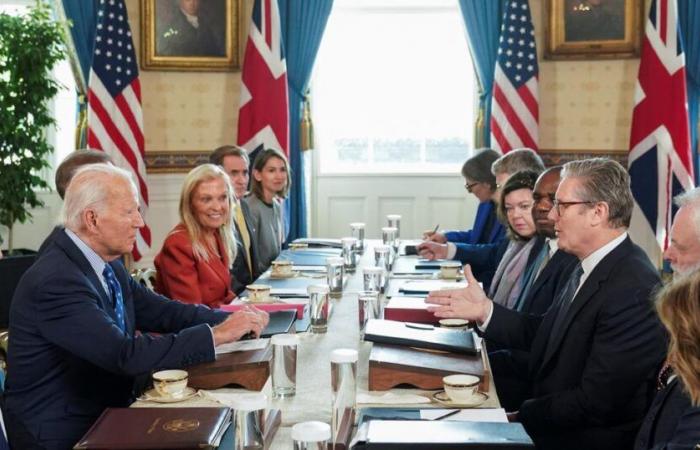Keir Starmer and Joe Biden reportedly discussed the possibility of a Russian-Iranian partnership during their meeting on Friday, the Guardian. Tehran would deliver missiles to Moscow, which would share “nuclear secrets” in exchange.
During his visit to Washington on Friday, Keir Starmer, the British Prime Minister, not only discussed with US President Joe Biden the delicate issue of Western long-range missiles delivered to Ukraine: should kyiv also be allowed to strike Russian territory with the Storm Shadow cruise missiles that the British are delivering to the Ukrainians? London and Washington have chosen to delay, while rejecting Russian warnings. For Vladimir Putin, such a case would mean that “NATO would be at war with Russia”. “Smoke and mirrors”denounced this Sunday morning the head of British diplomacy, David Lammy, who speaks of a “braggadocio”.
But the British press, which has not been kind to Starmer, who returned empty-handed from Washington, is now talking about a second subject of discussion addressed by the two leaders in Washington, more discreetly. “UK and US alarmed by possible nuclear deal between Iran and Russia”is the title this Sunday Guardian . And everything is intimately linked. On the one hand, while they were reluctant until then to cross this new “red line” Russian, London and Washington are considering changing their doctrine on the use of Western long-range weapons in Russia since they became certain last week that Iran has delivered to Russia more than 200 Fath-360 ballistic missiles, which Moscow will not fail to fire in Ukraine.
“Dramatic Escalation”
On the other hand, Americans and British fear that Moscow has “shared nuclear secrets with Iran in exchange for supply” of the said missiles, underlines the daily newspaper from across the Channel, evoking “British sources”. In Washington on Friday, “concerns” were thus expressed by Biden and Starmer about a possible “Iran trade” in order to obtain “nuclear technology”. During a visit to London last week, Antony Blinken, the American Secretary of State, had already expressed concern about this, but his comments were overshadowed by the subject of Iranian ballistic missiles sent to Russia. “On his side, [Moscou] shares technology sought by Iran – it’s a two-way street – including on nuclear issues as well as some space information.”he said.
Also read’90 Seconds to Midnight’: ‘Doomsday Clock’ Renews Warning Against Nuclear and Climate Threats
The head of American diplomacy had thus warned Tehran: “These developments and the growing cooperation between Russia and Iran threaten European security and demonstrate that Iran’s destabilizing influence extends well beyond the Middle East (…) We have warned Iran privately that this step [l’envoi de missiles iraniens en Russie, NDLR] “would constitute a dramatic escalation (…) The new president (…) has repeatedly stated that he wants to re-establish dialogue with Europe. He wants to obtain an easing of sanctions. Destabilizing actions like these will have exactly the opposite effect”In the process, Washington and the West announced new sanctions against Iranian companies.
This possible “nuclear deal” between Moscow and Tehran, which would bring the Islamic Republic closer than ever to the fateful threshold, would be born on the ashes of the“nuclear deal” of 2015, which was precisely aimed at removing the specter of such an eventuality. After years of negotiation, Tehran signed the JCPOA in Vienna (Joint Comprehensive Plan of Action)committing to drastically limiting its nuclear program to a level compatible with civil use of the atom, in exchange for a lifting of sanctions. But the text, co-signed at the time by the United States, France, the United Kingdom, Russia, China and Germany – so-called «5+1» – did not survive the election of Donald Trump in 2016, who unilaterally forced Washington out in 2018.
In a press release, Tehran announced the launch of several hundred new centrifuges, some of them in underground sites.
Since then, while still officially denying that it wants to acquire nuclear weapons – the Islamic Republic is a signatory to the 1968 Non-Proliferation Treaty and even issued a fatwa against nuclear weapons in 2005! – Tehran has gradually restarted its production of highly enriched uranium, well beyond the thresholds necessary for civilian industry. Last February, according to the International Atomic Energy Agency (IAEA), which monitors the implementation of the JCPOA, Iranian fuel stocks stood at 5.5 tonnes (compared to 4.5 tonnes four months earlier), or 27 times the limit authorized by the Vienna agreement.
Launch of a satellite
But since then, Tehran has announced through the press the launch of several hundred new centrifuges, some of them in underground sites. In mid-June, France, Germany and the United Kingdom condemned “a further escalation of Iran’s nuclear program, which carries significant proliferation risks”The three signatories of the Vienna agreement repeated the offense last week, Guardian recalling that Iran had accumulated four “significant quantities” which could each be used to make a nuclear bomb. However, having highly enriched uranium of military grade is not enough to produce a nuclear bomb. Crossing the threshold requires special scientific skills that Russia obviously has.
Even if Ifri researcher Héloïse Fayet recently recalled that Tehran has “all the physical means to develop a nuclear weapon, so all that is missing is political will”this Iranian-Russian collaboration feared by London and Washington would represent an additional step. On Saturday, Tehran incidentally sent another message by announcing that it had launched “successfully” a new research satellite built by its Defense Ministry. As has happened in the past with North Korea, Western powers have long feared that the launches are a backdoor way for Iran to advance its ballistic missile program, which would use technology to deliver a possible nuclear weapon.






